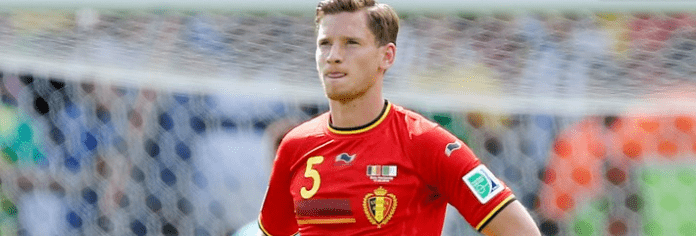A comeback win against Algeria and a late one against Russia has seen Belgium through to the next round of the World Cup. It is what many expected, the manner in which they achieved this success though was contrasting to pre-tournament belief. The Belgian “golden generation” were touted as dark-horses by nearly everyone, proving that they are in fact anything but dark horses. Marc Wilmots side were being championed as the attractive, youthful side of the World Cup, contrary to recent International football systems. But after two hours of football, you won’t be the only one feeling slightly disappointed with the Red Devils, despite the success.
Truth is, that against both Algeria & Russia, the Europeans didn’t outright deserve to win. They were in fact second best for large parts, disappointing many hipsters across the globe. While Algeria’s attacking flair was a worry for Wilmots, Russia’s pragmatic set-up proved equally problematic from a different angle. Ultimately Algeria’s lack of defensive consistency caught them out, whereas individual brilliance saw them past the Russians.
The problem for the Belgians started, though not as profoundly as recently, when they announced their squad. The attacking flair was there, a clear midfield set-up and a solid defense; somewhat too solid. It seemed as though the Belgians had taken too many central defenders, all capable of starting but impossible to accommodate.
As Wilmots announced his starting XI for the opening game across the back four, it comprised of all central defenders. He made changes for the second game, off went Jan Verthongen, in came Thomas Vermealen. A centre-back for centre-back at left-back, see the problem there?
The man we can look to who could have offered something different would have to be Sebastien Pocognoli who didn’t make it past the preliminary World Cup squad. Anthony Vanden Borre has, but he too hasn’t got a game. In retrospect, one can’t help but feel these two on either side of the defence could have made the World of difference for Belgium.
Essentially what this lack of natural full-backs does to the side is that it imbalances the entire play, both in attack and defence. In Hazard & Mertens, Belgium have two gifted players, both of whom would rather take up more central positions. This results in Hazard constantly cutting inside, while Mertens takes up the role of a striker in attack. He doesn’t cut inside, but he always tends to play a more narrow game.
This tendency of the wide men to play narrows results in Belgium having almost nothing on the wings. It’s a common deficiency of such systems, made up by the full-backs who are able to provide width or in rare cases, their central midfielders acting as temporary make-shift wide men. Neither Witsel or Fellaini/Dembele are capable of playing that role, the task thus falls upon the full-backs.
Belgium’s full-backs though are incompetent in attacking areas. You can’t suddenly expect primary centre backs to make runs down the wings, get into the channels, whip crosses in; it just isn’t as simple a job to do, especially in an era where the focus on full-backs is larger than ever. The full-backs movement in advanced areas is merely as a means to rotate possession, offering them an extra man to pass to. In terms of service and creativity, there isn’t much.
But one could say that Belgium’s attacking options should be enough to make up for this deficiency, possibly true. Thus it is now the burden on their defence which is becoming an issue.
You’d think that if looked at plainly, having solid centre backs out wide should be enough as a counter-measure against opposition attacks. Not quite. Even though the full-backs aren’t offering much in attack, they are getting forward, and thus getting back into position is constantly becoming an issue. We often don’t realise this task of full-backs, they need to have quick recovery and pace to get back rather than get forward. This is certainly lacking in Belgium’s full-backs, meaning that quickly winning possession could catch them out with a counter. And this has happened more often than not, leaving Wilmot’s side vulnerable.
Team are easily able to counter the slow Belgian defence with Algeria’s smooth quick play showing this in the first game, while Russia’s only attacking avenue were these counters. It has left Kompany & Van Buyten to deal with an overload from the opposition in attack, more often than not. Even experienced heads like those two will find it difficult in a 3-v-2 situation with pace against them.
Though Belgium have overcome this issue by registering two wins, a more competent side will find it fairly easy to catch them out. They can count their blessings that they haven’t disappointed the hipsters, but with potential big clashes in the next round, this full-back issue will prove to be a much large issue.
This article was written by Sami Faizullah. Editor-in-chief of outsideoftheboot.com
Add Sportslens to your Google News Feed!
